9B Unit3 Robot Grammar1 课件(29张)
文档属性
| 名称 | 9B Unit3 Robot Grammar1 课件(29张) | 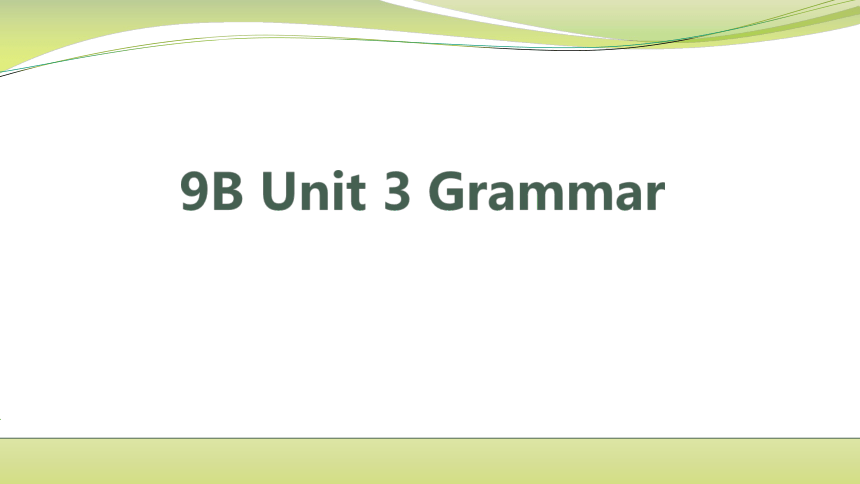 | |
| 格式 | pptx | ||
| 文件大小 | 1.2MB | ||
| 资源类型 | 教案 | ||
| 版本资源 | 牛津译林版 | ||
| 科目 | 英语 | ||
| 更新时间 | 2020-05-20 15:19:52 | ||
图片预览

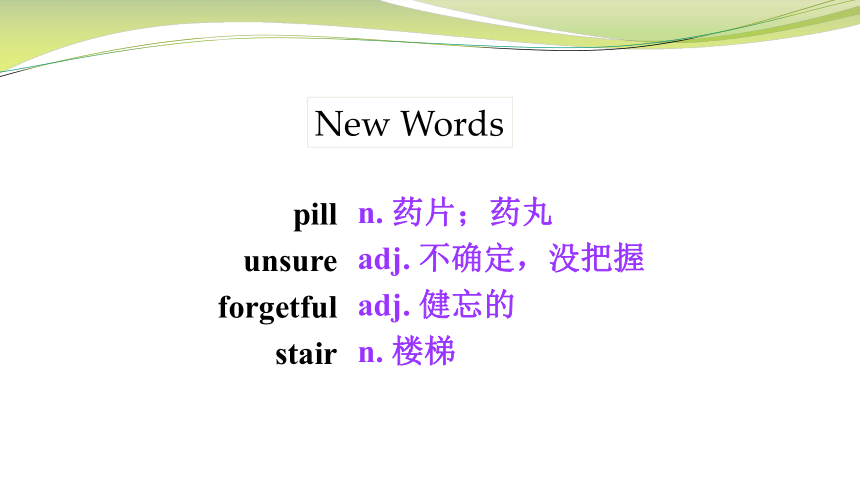
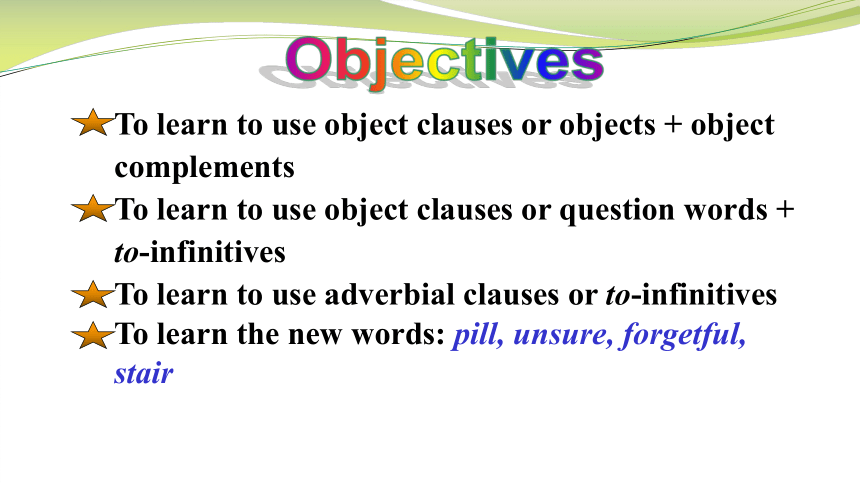
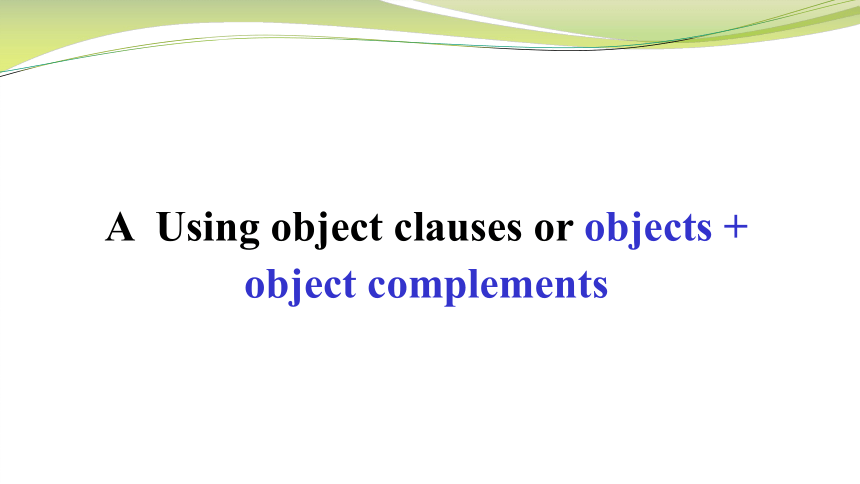
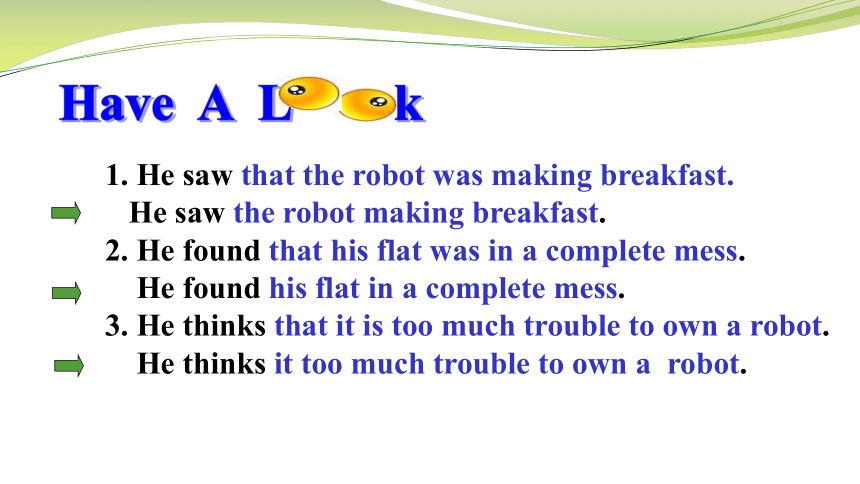
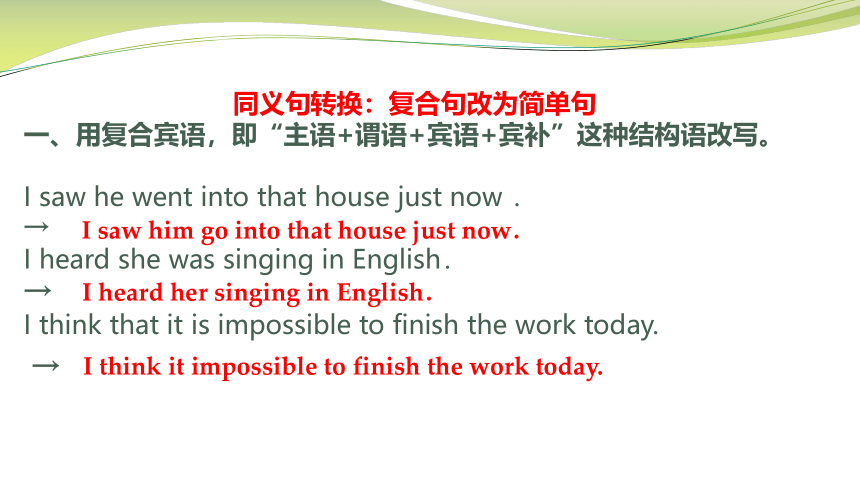
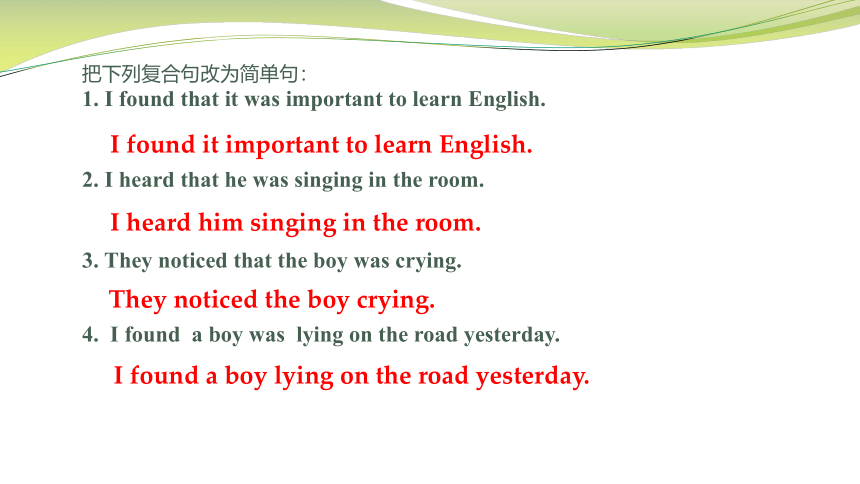

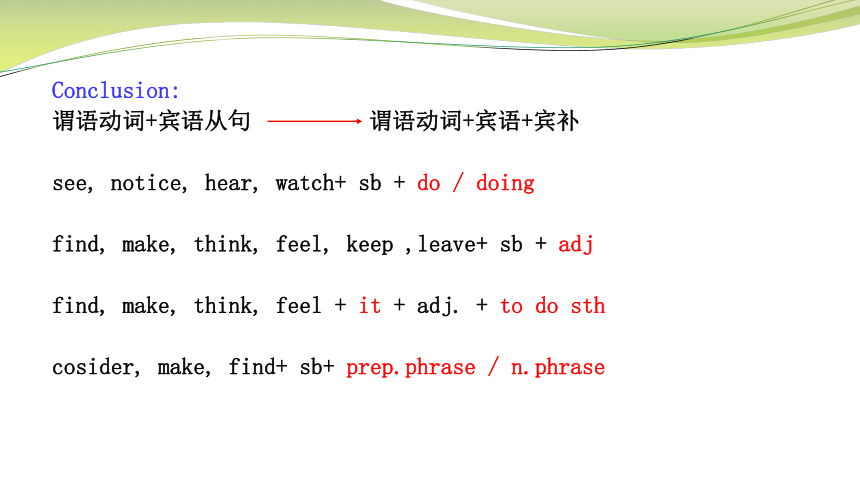
文档简介
(共29张PPT)
9B Unit 3 Grammar
pill
unsure
forgetful
stair
n. 药片;药丸
adj. 不确定,没把握
adj. 健忘的
n. 楼梯
New Words
Objectives
To learn to use object clauses or objects + object complements
To learn to use object clauses or question words + to-infinitives
To learn to use adverbial clauses or to-infinitives
To learn the new words: pill, unsure, forgetful, stair
A Using object clauses or objects + object complements
1. He saw that the robot was making breakfast.
He saw the robot making breakfast.
2. He found that his flat was in a complete mess.
He found his flat in a complete mess.
3. He thinks that it is too much trouble to own a robot.
He thinks it too much trouble to own a robot.
Have A L k
同义句转换:复合句改为简单句
一、用复合宾语,即“主语+谓语+宾语+宾补”这种结构语改写。
I saw he went into that house just now .
→
I heard she was singing in English.
→
I think that it is impossible to finish the work today.
→
I saw him go into that house just now.
I heard her singing in English.
I think it impossible to finish the work today.
把下列复合句改为简单句:
1. I found that it was important to learn English.
2. I heard that he was singing in the room.
3. They noticed that the boy was crying.
4. I found a boy was lying on the road yesterday.
I found it important to learn English.
I heard him singing in the room.
They noticed the boy crying.
I found a boy lying on the road yesterday.
Every day, I notice that the robot is busy with all kinds of housework.
When I get up, I find that my breakfast is ready.
When I come back from work, I find that my flat is as good as new.
I consider that the robot is a great help in my daily life.
I feel that it is comfortable to live with a robot.
Before the robot went wrong, Mr Jiang was talking on the phone with his mother about it. Use an object clause to rewrite each of his sentences. (P 42)
A
Conclusion:
谓语动词+宾语从句 谓语动词+宾语+宾补
see, notice, hear, watch+ sb + do / doing
find, make, think, feel, keep ,leave+ sb + adj
find, make, think, feel + it + adj. + to do sth
cosider, make, find+ sb+ prep.phrase / n.phrase
B Using object clauses or question words + to-infinitives
1. The robot no longer knew when it should cook breakfast.
The robot no longer knew when to cook breakfast.
2. Mr Jiang did not know what he should do with the robot.
Mr Jiang did not know what to do with the robot.
Have A L k
1. Kate didn’t know what she should do.
2. I have forgotten how I can use this word.
3. I don’t know who I can talk to.
Kate didn’t know what to do.
I have forgotten how to use this word.
I don’t know who to talk to.
二、用“疑问词+不定式“结构将宾语从句转换简单句。
主句的主语与从句的主语一致时,可将宾语从句转化为
“疑问词+不定式”结构。
1. I don’t know which one I can buy.
2.We wonder where we’ll go this Sunday.
3. Could you please teach me how I can search the Internet
4. Could you tell me when we should leave
I don’t know which one to buy.
We wonder where to go this Sunday.
Could you please teach me how to searh the Internet
Could you tell me when to leave
when to take your pills
Where to find your clothes
which to choose at the supermarket.
who to talk to
Mr Jiang wrote a letter to his mother before going on a business trip. Use a question word + to-infinitive to replace each object clause. Write them above the clauses. (P 43)
B
Notice
1. why 引导的宾语从句不能改成简单句
2. 疑问词在宾语从句中做主语时不能改成动词不定式
常见错误:
what to do it
who to talk
how to do
to choose which one
what to do
who to talk to
how to do it
which one to choose
C Using adverbial clauses or to-infinitives
Mr Jiang is always so busy that he does not have any time for hobbies.
Mr Jiang is always too busy to have any time for hobbies.
2. The robot is so smart that it can do a lot of things for Mr Jiang.
The robot is smart enough to do a lot of things for Mr Jiang.
3. Mr Jiang plans to buy a robot so that he can have more free time.
Mr Jiang plans to buy a robot in order to have more free time.
Have A L k
The boy is so young that he can’t go to school.
The question is so difficult that I can’t answer it .
The boy is too young to go to school.
1. 含有so…that引导的结果状语从句(否定)的复合句用“too…to…”结构可以转成简单句。
The question is too difficult for me to answer.
1.The girl is so tall that she can reach the apples on the tree.
2. This hall is so large that it can hold 2000 people.
3. The boy is so strong that he can carry the box.
The girl is tall enough to reach the apples on the tree.
This hall is large enough to hold 2000 people.
The boy is strong enough to carry the box.
2.含有so …that …引导的结果状语从句(肯定)的复合句用“…enough to do”结构可以将变为简单句。
Mary bought a camera so that she could take pictures.
Tom got up early so that he could catch the first bus.
She works hard so that she can catch up with us.
Mary bought a camera in order to take pictures.
Tom got up early in order to catch the first bus.
She works hard in order to catch up with us.
3. 含有so that 引导的目的状语从句的复合句用“in order to do sth” 结构可以转换为简单句。
I was so forgetful that I didn’t lock the door last night.
I was too forgetful _________________
______
2. The robot was so careful that it reminded me of this.
The robot was careful enough _________
__________.
to lock the door last
me of this
Mr Jiang’s mother was very pleased with the robot. She is telling Mr Jiang on the phone about her life with the robot. Rewrite her sentences with to-infinitives. (P 44)
C
night.
to remind
3. I was so weak that I couldn’t go up and down the stairs often.
I was too weak _____________________
_______
4. The robot was so kind that it brought me everything I needed.
The robot was kind enough __________
_________________
5. Sometimes I took a walk with it so that I could have a better sleep.
Sometimes I took a walk with it in order __________________.
to go up and down the stairs
to bring me
often.
to have a better sleep
everything I needed.
Conclusion
简单句和复合句之间的转换
在英语中,我们常可以用“宾语+宾语补足语”或“疑问词+动词不定式”将宾语从句转换成简单句。 如:
I found that it was difficult to learn English well.
→I found it difficult to learn English well.
She has forgotten how she can open the window.
→She has forgotten how to open the window.
注意:
⑴ 疑问词why不能和动词不定式连用。
⑵ 用“疑问词+动词不定式”将宾语从句转换成简单句的前提是主句的谓语动词通常是know, remember, learn, wonder, decide等。
Conclusion
简单句和复合句之间的转换
在英语中,我们可以用动词不定式将结果状语从句或目的状语从句转换成简单句。
结果状语从句so…that…句型可以用too… to…或(not)…enough to…来转换。如:
She is so tired that she couldn’t go on working.
= She is too tired to go on working.
Simon is so young that he couldn’t go to school.
= Simon is not old enough to go to school.
Conclusion
当从句的主语与主句的主语一致时,so that引导的目的状语从句可以改写成含in order to 的简单句。如:
注意:用动词不定式将结果状语从句或目的状语从句转换成简单句的前提是从句的主语和主句的主语一致。
We practise every day so that we can win the match.
We practise every day in order to win the match.
In order to win the match, we practise every day.
Conclusion
改写下列句子。
Tom’s mother found that he was a very good pupil.
Tom’s mother found _______________
______.
He didn’t tell me when we should meet again.
He didn’t tell me _________________.
him a very good
pupil
when to meet again
改写下列句子。
She’s taking a taxi so that she can get to
the airport on time.
She’s taking a taxi in order _________
_________________.
I’m so sleepy that I can’t do my homework.
I’m _____________________________
I’m so strong that I can carry this heavy box.
I’m strong __________________________
to get to
the airport on time
too sleepy to do my homework.
enough to carry this heavy box.
Thank you!
9B Unit 3 Grammar
pill
unsure
forgetful
stair
n. 药片;药丸
adj. 不确定,没把握
adj. 健忘的
n. 楼梯
New Words
Objectives
To learn to use object clauses or objects + object complements
To learn to use object clauses or question words + to-infinitives
To learn to use adverbial clauses or to-infinitives
To learn the new words: pill, unsure, forgetful, stair
A Using object clauses or objects + object complements
1. He saw that the robot was making breakfast.
He saw the robot making breakfast.
2. He found that his flat was in a complete mess.
He found his flat in a complete mess.
3. He thinks that it is too much trouble to own a robot.
He thinks it too much trouble to own a robot.
Have A L k
同义句转换:复合句改为简单句
一、用复合宾语,即“主语+谓语+宾语+宾补”这种结构语改写。
I saw he went into that house just now .
→
I heard she was singing in English.
→
I think that it is impossible to finish the work today.
→
I saw him go into that house just now.
I heard her singing in English.
I think it impossible to finish the work today.
把下列复合句改为简单句:
1. I found that it was important to learn English.
2. I heard that he was singing in the room.
3. They noticed that the boy was crying.
4. I found a boy was lying on the road yesterday.
I found it important to learn English.
I heard him singing in the room.
They noticed the boy crying.
I found a boy lying on the road yesterday.
Every day, I notice that the robot is busy with all kinds of housework.
When I get up, I find that my breakfast is ready.
When I come back from work, I find that my flat is as good as new.
I consider that the robot is a great help in my daily life.
I feel that it is comfortable to live with a robot.
Before the robot went wrong, Mr Jiang was talking on the phone with his mother about it. Use an object clause to rewrite each of his sentences. (P 42)
A
Conclusion:
谓语动词+宾语从句 谓语动词+宾语+宾补
see, notice, hear, watch+ sb + do / doing
find, make, think, feel, keep ,leave+ sb + adj
find, make, think, feel + it + adj. + to do sth
cosider, make, find+ sb+ prep.phrase / n.phrase
B Using object clauses or question words + to-infinitives
1. The robot no longer knew when it should cook breakfast.
The robot no longer knew when to cook breakfast.
2. Mr Jiang did not know what he should do with the robot.
Mr Jiang did not know what to do with the robot.
Have A L k
1. Kate didn’t know what she should do.
2. I have forgotten how I can use this word.
3. I don’t know who I can talk to.
Kate didn’t know what to do.
I have forgotten how to use this word.
I don’t know who to talk to.
二、用“疑问词+不定式“结构将宾语从句转换简单句。
主句的主语与从句的主语一致时,可将宾语从句转化为
“疑问词+不定式”结构。
1. I don’t know which one I can buy.
2.We wonder where we’ll go this Sunday.
3. Could you please teach me how I can search the Internet
4. Could you tell me when we should leave
I don’t know which one to buy.
We wonder where to go this Sunday.
Could you please teach me how to searh the Internet
Could you tell me when to leave
when to take your pills
Where to find your clothes
which to choose at the supermarket.
who to talk to
Mr Jiang wrote a letter to his mother before going on a business trip. Use a question word + to-infinitive to replace each object clause. Write them above the clauses. (P 43)
B
Notice
1. why 引导的宾语从句不能改成简单句
2. 疑问词在宾语从句中做主语时不能改成动词不定式
常见错误:
what to do it
who to talk
how to do
to choose which one
what to do
who to talk to
how to do it
which one to choose
C Using adverbial clauses or to-infinitives
Mr Jiang is always so busy that he does not have any time for hobbies.
Mr Jiang is always too busy to have any time for hobbies.
2. The robot is so smart that it can do a lot of things for Mr Jiang.
The robot is smart enough to do a lot of things for Mr Jiang.
3. Mr Jiang plans to buy a robot so that he can have more free time.
Mr Jiang plans to buy a robot in order to have more free time.
Have A L k
The boy is so young that he can’t go to school.
The question is so difficult that I can’t answer it .
The boy is too young to go to school.
1. 含有so…that引导的结果状语从句(否定)的复合句用“too…to…”结构可以转成简单句。
The question is too difficult for me to answer.
1.The girl is so tall that she can reach the apples on the tree.
2. This hall is so large that it can hold 2000 people.
3. The boy is so strong that he can carry the box.
The girl is tall enough to reach the apples on the tree.
This hall is large enough to hold 2000 people.
The boy is strong enough to carry the box.
2.含有so …that …引导的结果状语从句(肯定)的复合句用“…enough to do”结构可以将变为简单句。
Mary bought a camera so that she could take pictures.
Tom got up early so that he could catch the first bus.
She works hard so that she can catch up with us.
Mary bought a camera in order to take pictures.
Tom got up early in order to catch the first bus.
She works hard in order to catch up with us.
3. 含有so that 引导的目的状语从句的复合句用“in order to do sth” 结构可以转换为简单句。
I was so forgetful that I didn’t lock the door last night.
I was too forgetful _________________
______
2. The robot was so careful that it reminded me of this.
The robot was careful enough _________
__________.
to lock the door last
me of this
Mr Jiang’s mother was very pleased with the robot. She is telling Mr Jiang on the phone about her life with the robot. Rewrite her sentences with to-infinitives. (P 44)
C
night.
to remind
3. I was so weak that I couldn’t go up and down the stairs often.
I was too weak _____________________
_______
4. The robot was so kind that it brought me everything I needed.
The robot was kind enough __________
_________________
5. Sometimes I took a walk with it so that I could have a better sleep.
Sometimes I took a walk with it in order __________________.
to go up and down the stairs
to bring me
often.
to have a better sleep
everything I needed.
Conclusion
简单句和复合句之间的转换
在英语中,我们常可以用“宾语+宾语补足语”或“疑问词+动词不定式”将宾语从句转换成简单句。 如:
I found that it was difficult to learn English well.
→I found it difficult to learn English well.
She has forgotten how she can open the window.
→She has forgotten how to open the window.
注意:
⑴ 疑问词why不能和动词不定式连用。
⑵ 用“疑问词+动词不定式”将宾语从句转换成简单句的前提是主句的谓语动词通常是know, remember, learn, wonder, decide等。
Conclusion
简单句和复合句之间的转换
在英语中,我们可以用动词不定式将结果状语从句或目的状语从句转换成简单句。
结果状语从句so…that…句型可以用too… to…或(not)…enough to…来转换。如:
She is so tired that she couldn’t go on working.
= She is too tired to go on working.
Simon is so young that he couldn’t go to school.
= Simon is not old enough to go to school.
Conclusion
当从句的主语与主句的主语一致时,so that引导的目的状语从句可以改写成含in order to 的简单句。如:
注意:用动词不定式将结果状语从句或目的状语从句转换成简单句的前提是从句的主语和主句的主语一致。
We practise every day so that we can win the match.
We practise every day in order to win the match.
In order to win the match, we practise every day.
Conclusion
改写下列句子。
Tom’s mother found that he was a very good pupil.
Tom’s mother found _______________
______.
He didn’t tell me when we should meet again.
He didn’t tell me _________________.
him a very good
pupil
when to meet again
改写下列句子。
She’s taking a taxi so that she can get to
the airport on time.
She’s taking a taxi in order _________
_________________.
I’m so sleepy that I can’t do my homework.
I’m _____________________________
I’m so strong that I can carry this heavy box.
I’m strong __________________________
to get to
the airport on time
too sleepy to do my homework.
enough to carry this heavy box.
Thank you!
